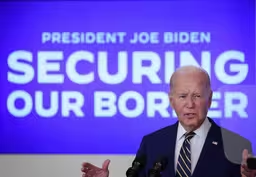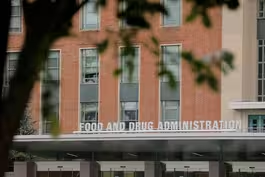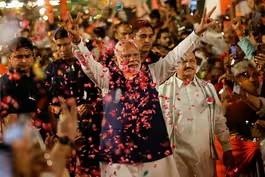
Sen. Kelly on supporting Biden’s plan to limit asylum
Clip: 6/4/2024 | 7m 40sVideo has Closed Captions
Sen. Mark Kelly explains why he supports Biden's plan to limit who can seek asylum
President Biden signed an executive order Tuesday limiting the number of migrants who can seek asylum at the southern border. Sen. Mark Kelly, a Democrat from the border state of Arizona, is supporting the president’s move. He joined Amna Nawaz to discuss the developments.
Problems playing video? | Closed Captioning Feedback
Problems playing video? | Closed Captioning Feedback
Major corporate funding for the PBS News Hour is provided by BDO, BNSF, Consumer Cellular, American Cruise Lines, and Raymond James. Funding for the PBS NewsHour Weekend is provided by...

Sen. Kelly on supporting Biden’s plan to limit asylum
Clip: 6/4/2024 | 7m 40sVideo has Closed Captions
President Biden signed an executive order Tuesday limiting the number of migrants who can seek asylum at the southern border. Sen. Mark Kelly, a Democrat from the border state of Arizona, is supporting the president’s move. He joined Amna Nawaz to discuss the developments.
Problems playing video? | Closed Captioning Feedback
How to Watch PBS News Hour
PBS News Hour is available to stream on pbs.org and the free PBS App, available on iPhone, Apple TV, Android TV, Android smartphones, Amazon Fire TV, Amazon Fire Tablet, Roku, Samsung Smart TV, and Vizio.
Providing Support for PBS.org
Learn Moreabout PBS online sponsorshipAMNA NAWAZ: Senator Mark Kelly is a Democrat from the border state of Arizona.
He supports the president's move and he joins me now.
Senator Kelly, welcome back to the "NewsHour."
Thanks for joining us.
SEN. MARK KELLY (D-AZ): Well, thank you for having me on, Amna.
AMNA NAWAZ: Let me ask you about the president's move today, because to take this step some three weeks before the first presidential debate, some five months before the election, when polls do show immigration is a top voting issue for many, leaves many to think that it's a political decision and not a policy one.
As you have noted, Republicans walked away from a border deal back in February, but the president has always had this authority.
So why this move now?
SEN. MARK KELLY: Well, first of all, Arizonans and folks who live in other border states deserve to have real solutions for this problem and deserve to have a border that's under control.
It's often been out of control.
I have been in the United States Senate for about three years, and it's really been unfair, especially to people who live close to the border.
I talk to mayors and sheriffs all the time about this issue.
And we had an opportunity -- and you talk about the politics behind this.
We had an opportunity with bipartisan legislation negotiated by Democrats and Republicans and the White House, worked on for months.
We were right up to the finish line on this legislation.
And the politics of the presidential election superseded everything, where the former President Donald Trump decided that he did not want this legislation passed and was able to get my Republican colleagues in the Senate to run away from a comprehensive piece of legislation that was going to help the Border Patrol, help CBP, help communities in Southern Arizona and other states.
I have never seen -- I have never seen... AMNA NAWAZ: Yes, sir.
And, as I noted -- pardon the interruption -- this was back in February.
SEN. MARK KELLY: That is correct.
AMNA NAWAZ: So President Biden could have taken the facts sooner.
Why now?
SEN. MARK KELLY: Well, he's been calling on Congress for the last three-and-a-half years to do something on this issue.
We were going to have more Border Patrol agents on the border, funding for that, more CBP agents, judges to adjudicate, asylum claims, machines to detect fentanyl, changes in asylum policy.
These were all very positive steps.
I spent a lot of time on the border in Arizona, and it's very unfair, especially to the Border Patrol agents, who have -- who often lose control of the situation.
The president was put in a situation where he had to do this unilaterally without Congress.
But, ultimately, the solution is for Congress to come back together.
I hope this can happen soon.
It may have to wait until after the election, unfortunately, and have not only a border security bill, but comprehensive immigration reform that supports our economy to help us grow our economy, to provide for companies the work force they need.
AMNA NAWAZ: Senator, let me ask you about what President Biden has said previously, because he did slam then-President Trump for using this exact same authority to restrict asylum years ago.
Here President Biden is actually debating Mr. Trump back in 2020.
JOE BIDEN, President of the United States: This is the first president in the history of the United States of America that says anybody seeking asylum has to do it in another country.
That's never happened before in America.
That's never happened before in America.
You come to the United States, and you make your case.
AMNA NAWAZ: Senator, the question is, why should migrants today not have that right under international law and U.S. immigration law to make their case?
SEN. MARK KELLY: Well, this is different than what President Trump did.
You know, this... AMNA NAWAZ: It is under the same authority, though, to restrict asylum access.
SEN. MARK KELLY: Well, it's under the same - - essentially, the same federal -- yes, same federal authority to put restrictions.
But this doesn't change the ability for individuals to come here and seek asylum.
What it does is, if the numbers go up to a point where it's unmanageable, we will temporarily close the southern border for people to enter between ports of entry.
They will still have the CBP-1 app to lawfully seek asylum.
That's available today.
It's been available for some time now.
So there will be pathways.
AMNA NAWAZ: Senator, as you know, that's a very restricted app with very restricted access.
This would essentially restrict access across the southern border for people to arrive and make an asylum claim.
SEN. MARK KELLY: It's true.
Well, I don't agree with you that the CBP-1 app is restrictive.
It may be challenging at times to get an appointment.
But the idea behind the app is, you register ahead of time, you go to a port of entry, you get an appointment for an asylum claim.
People will still be able to do that.
What will happen, though, if the numbers go up above a certain average in a given week, until they go back down, we will restrict people from coming across the southern border.
Hey, we are a country of immigrants.
And it's very important to me that people can come here when they meet the requirements to have an asylum claim, that they can come to our country, especially children, people that have special needs and other issues that they're facing in their home country.
That's important.
But what's also important is that this is safe for Border Patrol, for CBP officers, for people who live in these southern border communities.
And over time, it has not been a safe situation.
It also needs to be safe for the migrants.
When Border Patrol gets overwhelmed with the number of individuals and people are waiting in the desert, essentially, with no water, no food, and Border Patrol can't manage this, this is not good for them.
We have migrants that die, that pass away in the desert.
We're trying to get operational control over the situation.
It's unfortunate that the legislation in February did not pass.
That provided Border Patrol, CBP with the tools they need to manage this.
But it became political because of the former president didn't want this issue solved.
So Republicans ran away from this.
Ultimately, Amna, we need comprehensive immigration reform and we need border security.
AMNA NAWAZ: Senator, I have been on the Mexican side of the border during previous times of border restrictions and seen families who then have to decide whether or not they will decide to send their kids alone, because, obviously, unaccompanied minors still do get access.
Are you at all worried this is going to fuel another potential crisis of children arriving alone at the U.S. border?
SEN. MARK KELLY: Of course I'm worried.
I mean, we don't want to see kids winding up in a situation where, in Mexico, they're separated from their parents.
That's not the goal here.
I was speaking to the -- Ali Mayorkas, the secretary of homeland security, today about this.
And as we roll out these changes in policy, what we expect to see is the number of individuals that are entering our country between ports of entry and who are not using things like the CBP-1 app and other lawful means to come to the United States and seek asylum, that those numbers will trend down significantly.
That's the expectation.
AMNA NAWAZ: That is Senator Mark Kelly, Democrat from the border state of Arizona, joining us tonight.
Senator Kelly, thank you for your time.
Good to see you.
SEN. MARK KELLY: Thank you, Amna.
Biden order restricts how many migrants can seek asylum
Video has Closed Captions
Clip: 6/4/2024 | 5m 26s | Biden order restricts how many migrants can seek asylum at southern border (5m 26s)
FDA rejects attempt to use MDMA for PTSD treatment
Video has Closed Captions
Clip: 6/4/2024 | 8m 47s | FDA panel rejects attempt to use psychedelic drug for PTSD treatment (8m 47s)
Modi reelected but party losses could affect his 3rd term
Video has Closed Captions
Clip: 6/4/2024 | 3m 40s | Modi wins 3rd term as India's prime minister, but party losses could affect how he governs (3m 40s)
Some universities return to standardized tests in admissions
Video has Closed Captions
Clip: 6/4/2024 | 9m 13s | Why some universities are returning to standardized testing in admissions process (9m 13s)
Providing Support for PBS.org
Learn Moreabout PBS online sponsorshipSupport for PBS provided by:
Major corporate funding for the PBS News Hour is provided by BDO, BNSF, Consumer Cellular, American Cruise Lines, and Raymond James. Funding for the PBS NewsHour Weekend is provided by...














